In honor of the 20th anniversary of the North American Taiwan Studies Association (NATSA), we invite paper proposals from scholars in the humanities and social sciences for our June 20-21 anniversary conference to be held at the University of Wisconsin-Madison. Sponsored by Academia Sinica’s Institute of Taiwan History and Institute of Sociology and by the University of Wisconsin-Madison’s East Asian Legal Studies Center and Center for East Asian Studies, the theme for our 2014 conference will be “The Zeitgeists of Taiwan: Looking Back, Moving Forward.” We are calling for papers on the main theme or any of our seven sub themes outlined below from a broad range of social science and humanities disciplines. We are especially excited to offer a new Publication Peer-Review Option to participating junior scholars who may be interested in honing their original articles on Taiwan for publication.
Announcement: North American Taiwan Studies Association Conference -- June 20-21, 2014, Madison, WI10/15/2013 Call for papers, "The Zeitgeists of Taiwan: Looking Back, Moving Forward". The North American Taiwan Studies Association, or NATSA, has set a date for next year's annual conference: June 20-21, 2014, at the University of Wisconsin:
0 Comments
A weekly summary of political news from Taiwan 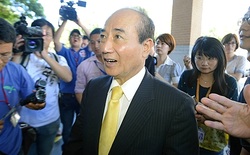 You win this one, Mr. Wang. The Ma-Wang dustup is settling down into something approaching detente, with Wang having survived an intra-party assault on his position initiated by President Ma, and Ma now looking to cut his losses and make up. On Monday, the KMT's central leadership decided not to appeal the latest court decision by the Taiwan High Court upholding the injunction against expelling Speaker Wang from the party, suggesting that they held little hope of overturning the ruling at the Supreme Court. The courts in Taiwan have been understandably reluctant to intervene in politically charged cases in recent years, as this manuscript by Wei-tseng Chen and Chia-hsin Hsu argues. Some speculation on my part here, but because the lower court rulings temporarily stopped Wang's expulsion, the Supreme Court would have had to overturn those decisions for the KMT action to take effect. The path of least resistance for the Court in this instance is to sustain the injunction and allow the legal process to play out at the district court. That appears to be what the KMT expected--hence the decision not to appeal. So, Wang lives to fight another day, holding onto not only his party list seat but also the speakership--a remarkable turn of events given just how dire his political future looked a month ago. The case at the district court probably won't be decided before the next legislative election, at which point Wang can run for, and probably win, a district seat in his base of Kaohsiung County. 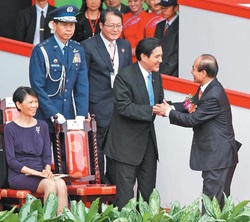 Hello, I must be going (皮笑肉不笑). October 10 is the National Day of the Republic of China, or more informally, Double-Ten Day (雙十節). This year's festivities were a bit more interesting than usual. Since Wang Jin-pyng was director of the National Day Celebration organizing committee, tradition dictated that he and President Ma sit on the same stage together, separated only by the first lady, Chow Mei-ching (周美青). In the end, Ma and Wang played nice for the cameras and struck conciliatory tones toward one another in their respective speeches. Another sign of reconciliation, perhaps: both wore the same silly hats. The shot below is tailor-made for a caption contest: We got a lot of problems with you! The official government events were not the only political theater of the day. A large collection of protestors, estimated variously anywhere between between 10 and 60 thousand people, rallied at several locations near the Presidential Hall. As news reports highlighted, the demands of protesters were quite diverse, ranging from opposition to nuclear power to demands for reform of the military punishment system. The one thing uniting them all: a desire for President Ma to step down, or to be impeached. That is unlikely to get far, given the KMT's comfortable majority in the legislature. But it is another sign of how unpopular Ma is right now. 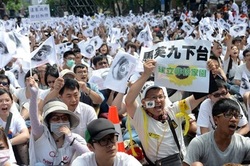 More interesting is that the rallies are the latest manifestation of an upswing in intensity of street protests over the Ma administration's second term. Taiwan has a long history of street protest dating back to the martial law days, but the frequency and size of demonstrations has varied considerably over the years, waxing during the gradual transition to direct election of the legislature and president in the late 1980s and early 1990s. Now, there's something of a return to earlier times in these rallies, as advocacy groups seem more willing than in the past decade to try public demonstrations as a way to bring attention to their causes and to shape the national political discourse. There are a couple of intriguing questions here. One, is this apparent rise in protest real, or are the numbers and demands of street demonstrators not much different from a decade ago? And two, if it is real, what is driving it? To what degree can this upswing be attributed to the fact that the DPP is completely shut out of power, versus a "supply-side" explanation focusing on rising grievances--housing prices, nuclear power, stagnant wages, perceived government corruption, and so forth? I suspect that unified KMT control has shut many channels for social advocacy groups to have real influence on policy-making, although the ultimate success of these groups under the Chen Shui-bian administration was also limited (gated article). Unfortunately, I haven't been able to locate much in the way of recent academic work on social movements in Taiwan that speaks to these questions, or even that describes these groups in much detail. (For instance, it would be really helpful to know more about the origins of some of the protests, such as the rather odd Citizen 1985 movement described here.) An opportunity for some future researchers, perhaps... UPDATE: The China Policy Institute Blog is running an interesting series of posts on Taiwanese politics to coincide with Double Ten Day.
A weekly summary of political news from Taiwan 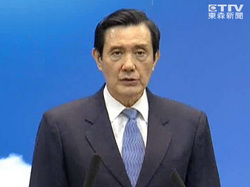 Trouble in the Family (煮豆燃萁). The "Ma-Wang showdown" erupted into a full-blown political scandal in the past week. On Sunday, news broke that phone surveillance by the Special Investigative Division (SID) of the Supreme Prosecutor's Office had been much more extensive than previously revealed. The SID's wiretaps included the phones of other legislators besides Ker Chien-ming (柯建銘), the DPP's party whip and the office's initial target. It also apparently included the legislature's central switchboard. Even prominent KMT officials including New Taipei City mayor Eric Chu (朱立倫), Taipei Mayor Hau Lung-pin (郝龍斌), and Taoyuan County John Wu (吳志揚) are inveighing against the SID. The revelation has put the methods used to approve wiretapping under intense scrutiny, particularly by people who are well-placed to do something about it: the legislators themselves. Suddenly, individual privacy and especially proper judicial procedure are hot issues for discussion. 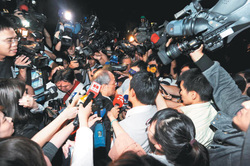 Besieged on All Sides (四面楚歌) At the center of the political storm is the SID's chief prosecutor Huang Shih-ming (黃世銘). Huang is under fire for two separate issues: potentially overstepping the SID's authority to wiretap, and improper collusion with President Ma in the announcement of the case against Wang Jin-pyng. The Ministry of Justice has formed a task force to investigate the wiretapping allegations, and Huang has already been grilled by members of the legislature over the matter. Then there is the separate leak investigation opened by the Taipei District Prosecutor's Office, for which Huang, President Ma, Ma's former deputy secretary Lo Chih-chiang (羅智強), and Premier Jiang have all been summoned to give testimony. To complicate matters further, the Control Yuan (檢察院), an odd and increasingly irrelevant relic of the original Sun Yat-sen-designed constitution that is supposed to monitor government behavior, has joined the fun and broadened its own investigation of "improper influence" by officials. In case you've lost count, that's three separate investigations that Huang Shih-ming has triggered in the past week. With all the controversy swirling around him, Huang has not fallen on his sword to protect Ma Ying-jeou, either, doing little to dispel the impression that his actions were closely coordinated with the Presidential Office and seeming more interested in saving his own skin. Ma’s popularity ratings are pretty dismal, registering at 15% in some recent polls. Ma, for his part, has denied trying to influence the Special Investigative Division's actions. 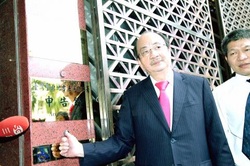 Schadenfreude (幸災樂禍). All the scrutiny of Huang this week has crowded out the original story of possible malfeasance by Wang Jin-pyng and Ker Chien-ming. Remarkably, Ker is now suing both Huang and Ma. For his part, Wang won another court decision on Monday, sustaining his injunction against being expelled from the KMT. The next step: the Supreme Court. If the injunction is upheld there, then Wang will probably survive through the end of the term, as his lawsuit against the KMT may not be settled for years. Lest the DPP gain too much enjoyment out of the KMT's turmoil, allegations of malfeasance against one of their own were also in the news this week. Tsai Ying-wen (蔡英文), the DPP's former party chairwoman and 2012 presidential candidate, was censured by the Control Yuan for "dereliction of duty" in her role as vice premier in 2007. Tsai approved government investments in a biotech start-up that totaled about US $1.4 billion, then later worked as a spokesperson for the company after leaving government. Notably, the same Special Investigative Division that's now in hot water over wiretapping closed its investigation into the Tsai case in August 2012, finding no evidence of wrongdoing. That fact plus the timing of the announcement suggests a possible political motive behind the decision, and may generate more interest in the DPP in abolishing the Control Yuan. On October 11 and 12th, the Taiwan Democracy Project at the Center for Democracy, Development, and the Rule of Law at Stanford University, in cooperation with the Shorenstein Asia-Pacific Research Center, will hold its 8th annual conference, on the Trans-Pacific Partnership (TPP). The conference is open to the public. Further details and a place to RSVP are here. The event description is below. The TPP is a free trade agreement currently being negotiated by twelve Pacific Rim countries that has the potential to re-shape economic relations in the region for the coming decades. This conference will bring together policymakers and scholars from Taiwan with leading specialists from other Asian countries and the U.S. to examine the evolution, geopolitics and future of the TPP, and also to consider how Taiwan is responding to the challenge of freer trade and what its strategy for deepening its trade relations and maintaining its economic development should be.
Among the issues to be addressed are:
This event is co-sponsored by The Walter H. Shorenstein Asia-Pacific Research Center. The attempt by the KMT leadership to remove Wang Jin-pyng as speaker of the Legislative Yuan has a lot of interesting elements to it. For electoral studies geeks, though, the most fascinating might be that Wang was elected on the KMT’s proportional representation or "at-large" list (不分區) rather than from a single-member district (單一選區). As a consequence, he is especially vulnerable to purge attempts: unlike district legislators, Wang depends on his party’s support to retain his seat for this term. A little background first: since 1995, Taiwan has had a mixed-member electoral system (混合制) with two parallel electoral tiers. Up until 2004, the larger, district-level tier consisted of between 25-30 multi-member districts (複數區), with multiple representatives elected from each district using the single non-transferable vote (SNTV) (不可轉移單票制). The smaller, national-level tier consisted of a single nation-wide district in which seats were awarded to parties using closed-list proportional representation (CL-PR), based on the percentage of the vote that each party's district candidates won aggregated across all districts. A major reform* before the 2008 election halved the size of the legislature, replaced the multi-member districts with single-member ones, and introduced a separate vote for the PR tier, but retained the closed-list rule for the PR seats. 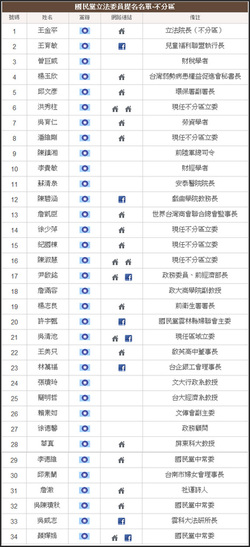 Winning the List The "closed" part of "closed list" PR means that the party, not voters, controls who gets these seats. It does so by submitting a ranked list of names (分配當選名單) prior to the election; when the seat totals for each party are announced, the PR seats are distributed down the list until the party's quota is met. For instance, in the 2012 legislative election, the KMT won 16 seats in the PR tier, so the top 16 candidates on its party list were awarded seats. This is how Wang Jin-pyng was most recently elected: he was ranked first on the list. (You can find the lists for this and other elections at the Central Election Commission website. The image at right was pulled from here.) It is not hard to see that the order of names on the party list goes a long way toward determining who gets seats. The first candidate on the list is as good-as-elected once the list is submitted, unless the party fails to win any PR seats. But the 16th candidate will have to sweat out the election. And the 34th candidate has no realistic hope of winning a seat whatsoever. Thus, whoever controls the party list controls the electoral fates of all the PR legislators. Typically, party leaders determine the ranking and put themselves and their allies** at the top of the list, while incumbents who've ticked off the party leadership get left off entirely. So legislators elected from the PR tier have to toe the party line if they want to remain in office. But that's not all. Taiwan electoral law also provides political parties another weapon to keep list legislators in line: the Civil Servants Election and Recall Act (公職人員選舉罷免法) specifies that any at-large legislator who loses his party membership will also immediately lose his seat. Hence why Wang Jin-pyng was so vulnerable to a purge by President Ma: as an at-large legislator, his seat depends on the continued tacit support of the rest of the party. Rather than wait until the run-up to the next election to deny Wang his previous position on the party list, Ma and his allies could remove him immediately by stripping him of his party membership. It is only through a rather surprising, and lucky, district court injunction that Wang has so far survived the attempt to boot him from the legislature. 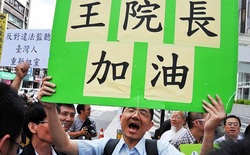 Whither Wang? It's noteworthy that Wang Jin-pyng has not always been an at-large legislator for the KMT. Until 2004, he was one of several legislators representing Kaohsiung County's First District, and a quite popular one at that. If he were still a district legislator, stripping him of his party membership would not have had the same effect; he would have retained his seat. That raises the question, why would a leading politician like Wang ever join the party list? The answer is that it’s a sure-fire way to get into the legislature without having to win a district-level election. Campaigns for legislative district seats were notoriously fierce, and costly, under the old SNTV system, because candidates had to compete for votes not only against nominees from other parties but also with their own fellow party members. Winning a seat usually required relentless effort to differentiate oneself from everyone else and cultivate personal ties to constituents. (And, all-too-frequently, some form of vote-buying.) So when Wang first ran on the party list in 2004, when SNTV was still in place, it was undoubtedly appealing to him to leave behind the trouble of district campaigning. The switch to single-member districts in 2008 eliminated most intra-party competition, but at that point Wang was already ensconced at the top of the KMT list and had no reason to return to a district. Now, of course, he does. My money is on him returning to his old Kaohsiung County district and running there in 2016, where he retains a base and can probably win comfortably. Whether or not he hangs on to his seat through the end of this term, I doubt we have seen the last of Speaker Wang. ----------------------------------------------------------------------------------------------------------------------------------- [* Taiwan's history of electoral system changes is dauntingly complex, even post-martial law era. I will attempt to cover it in a future post.] [**I'd forgotten, it's an electoral law rule, not an intra-party rule. So all parties are required to reserve at least half their PR list seats for women.]
|
About MeI am a political scientist with research interests in democratization, elections and election management, parties and party system development, one-party dominance, and the links between domestic politics and external security issues. My regional expertise is in East Asia, with special focus on Taiwan. Archives
January 2024
Categories
All
|
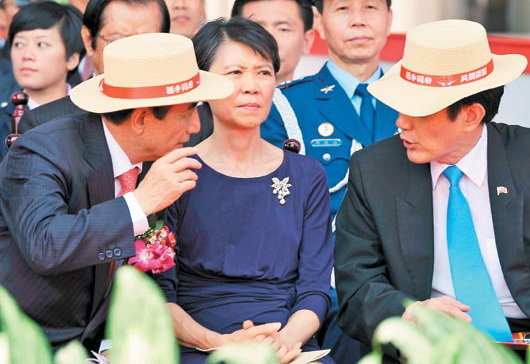
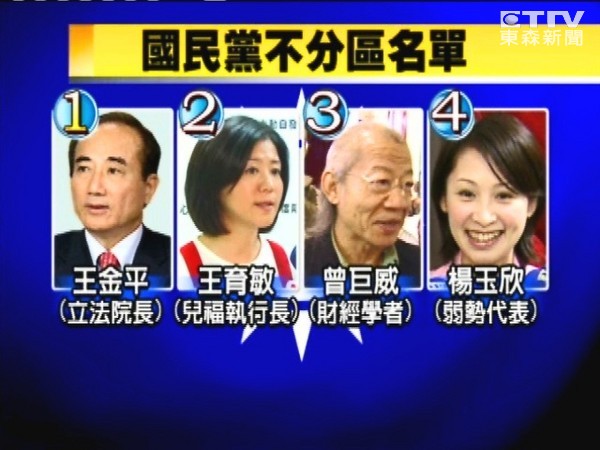
 RSS Feed
RSS Feed
